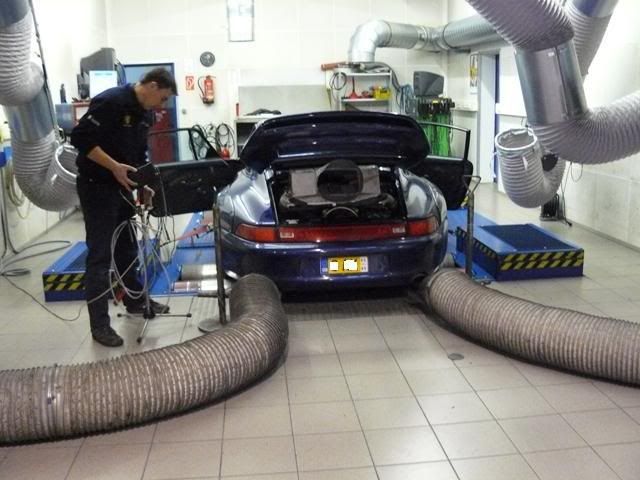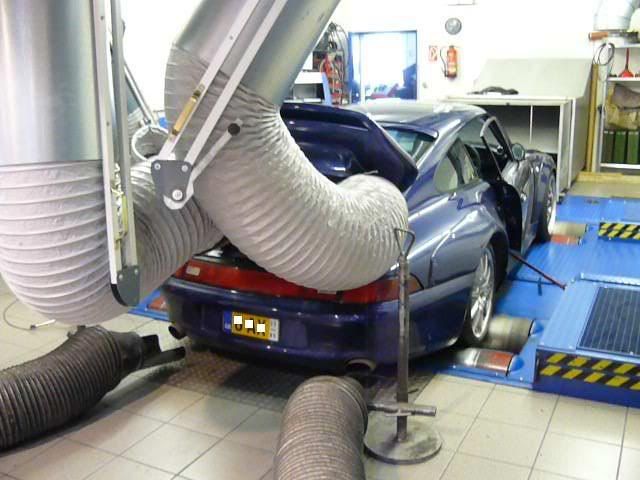"Real" BHP 993tt?
#16
Yes, you are right. However since I have been told by some persons that know my car before I got it, rumored that my car was equipped with bigger turbos (factory). The only thing I have done so far, is measure the inlet before the compressor wheel, where is machined the housing and got arround 43mm where the K16 has less than 41mm I believe, something like 40.71mm or so...which make me believe this car has the K24's.
Originally Posted by Basal Skull
I believe a mustang dyno is mechanically linked - so probably okay. Apparently there's some list of Porsche approved dynos but never seen this list. Most recommend to uncouple the front drive. Again do a search, there's a bunch of threads on the topic
I will search for more info about this subject, I don't want to ruin my car

#17
Hey guys . Lets' not be hi-jacking me post. All we're looking for here is unmolested stock dyno tested HP and torx. Out of all of these posts I'm only seeing 1 (one) response and no clarification on "at the flywheel" #'s................So would that be 350.98/.85=412.9BHP at the flywheel and 379.41/.85=446lb/ft torx?.........85 being the loss between the flywheel and the wheels. If so that's similar BHP to the published 408BHP but waaaayyyyy more torx vs. published 400lb/ft. Just to confirm, are you all stock?
#19
My recently purchased turbo is believed to be completly stock, yet it produced 438bhp on the dyno (see 'Dave Parslow TT' on the attached list - the previous owner); arguably the dyno is producing results a little on the high side though - don't forget these are in UK rather than US state of tune.
Attachment 733252
Attachment 733252
Last edited by Stewart; 06-23-2015 at 09:58 AM.
#20
Hey guys . Lets' not be hi-jacking me post. All we're looking for here is unmolested stock dyno tested HP and torx. Out of all of these posts I'm only seeing 1 (one) response and no clarification on "at the flywheel" #'s................So would that be 350.98/.85=412.9BHP at the flywheel and 379.41/.85=446lb/ft torx?.........85 being the loss between the flywheel and the wheels. If so that's similar BHP to the published 408BHP but waaaayyyyy more torx vs. published 400lb/ft. Just to confirm, are you all stock?


If you can't keep the intake air temp below about 38C then the program will retard the ignition and you will not have your 408PS DIN.
Forget silly torque numbers these come about because certain chassis dynos simply are not able to calculate the peak torque as the surge of acceleration when the boost comes in, they don't effectively brake the engine which causes these silly torque numbers. If braked properly like on an engine dyno the peak torque will be as stated by the manufacturer.
#21
Wow. Huge variances. Dyno ratings above at 350, 384, 408 and 438. Not really conclusive re: stock HP. Wonder how much is dyno variance and what's due to mods. Chipping and higher rated turbos will add lots of power while after market exhaust, LWF and engine mounts can loose ya HP. Anyone else care to add data?
#22
My recently purchased turbo is believed to be completly stock, yet it produced 438bhp on the dyno (see 'Dave Parslow TT' on the attached list - the previous owner); arguably the dyno is producing results a little on the high side though - don't forget these are in UK rather than US state of tune.
Attachment 733252
Attachment 733252
#23
My recently purchased turbo is believed to be completly stock, yet it produced 438bhp on the dyno (see 'Dave Parslow TT' on the attached list - the previous owner); arguably the dyno is producing results a little on the high side though - don't forget these are in UK rather than US state of tune.
#25
I'm under no illusion that those dyno figures are on the 'optimistic' side. However, consider more the relative performance figures. If the dyno was reading say 10% too high, my turbo would be at c400bhp, but that would mean some of the others are way down - I guess you have to expect to loses some ponies over the years (17+), but Porsche are well know for being conservative with their performance figures.
#26
Porsche are (or certainly were back when the 993 turbo was new) very clinical about accuracy of their power figures, they used to quote DIN corrected and had an elaborate cooling set up for engine dyno testing the turbo motors
#28
Thanks a bunch for fwding AiRick. So would that be 350.98/.85=412.9BHP at the flywheel and 379.41/.85=446lb/ft torx?.........85 being the loss between the flywheel and the wheels. If so that's similar BHP to the published 408BHP but waaaayyyyy more torx vs. published 400lb/ft. Just to confirm, are you all stock? According to Flat 6 Inovations, you can loose significant BHP with most after market exhausts, flywheels and engine mounts.
Interesting comments about a 'linked' dyno, I wonder why that would be? front and rear axles must be able to transfer torque independently to accommodate different grip levels etc, so why would different rolling rates bother the differentials?
#29
The awd system in our cars are pretty primitive, relying on some 'slip' to heat up a silicone based fluid that stiffens as it warms up. It can't transfer torque like modern systems. (That's why we are **** about tire sizes front vs rear) If the rollers are not linked, the viscous coupler heats up too much until it fails...as many on this list have experienced.
#30
The awd system in our cars are pretty primitive, relying on some 'slip' to heat up a silicone based fluid that stiffens as it warms up. It can't transfer torque like modern systems. (That's why we are **** about tire sizes front vs rear) If the rollers are not linked, the viscous coupler heats up too much until it fails...as many on this list have experienced.
Sidebar: three seasons of Formula ford meant measuring an awful lot of Hoosier and Goodyear slicks with a tape. Always found it interesting how big the variations were both right out of the molds and through the day with temp variations. Wonder how much variance there is on production tires...



